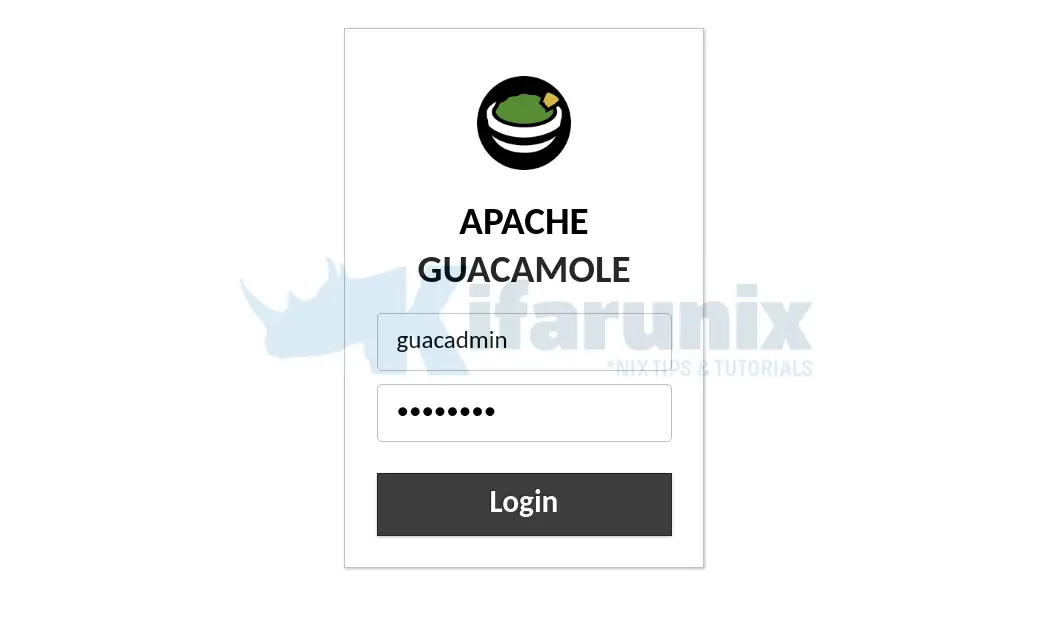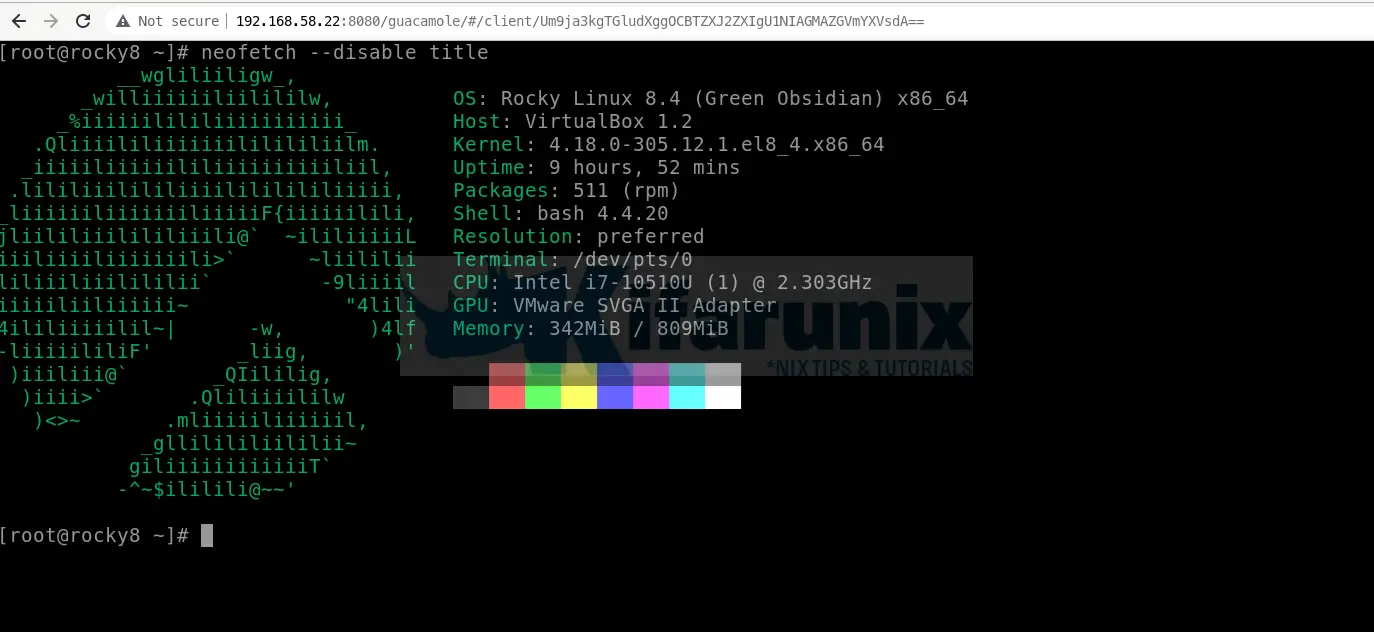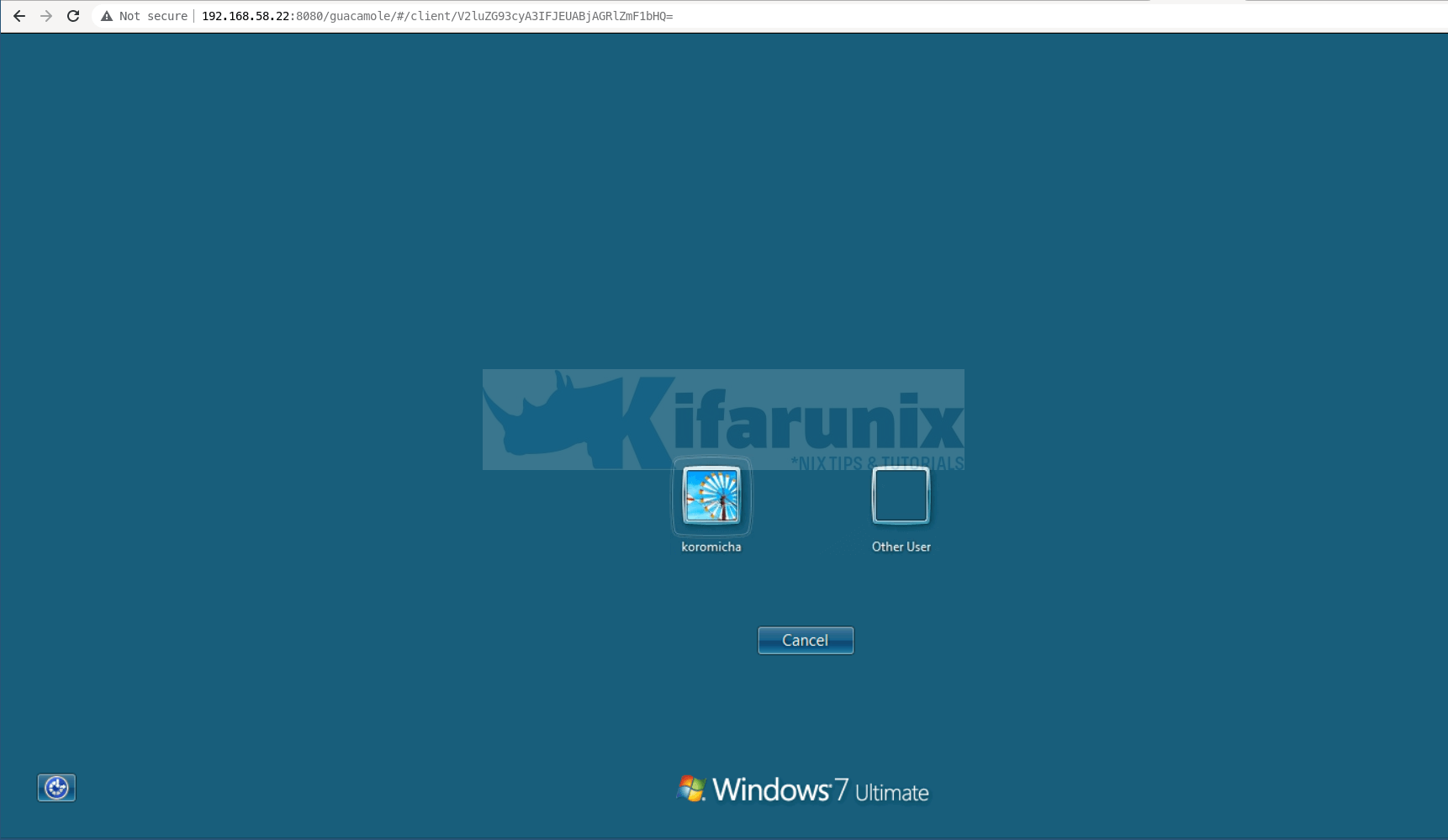In this guide, you will learn how to install Guacamole on Debian 11. Apache Guacamole is a client-less HTML5 web based remote desktop gateway which provides remote access to servers and desktops through a web browser. It supports standard protocols like VNC, RDP, and SSH.
Using Debian 12? Try this guide below;
How to Install Guacamole on Debian 12
Table of Contents
Installing Guacamole on Debian 11
Guacamole is made up of two parts;
guacamole-server, which provides the guacd proxy and all the native, server-side components required by Guacamole to connect to remote desktops.guacamole-clientwhich provides the client to be served by the servlet container which is usuallyTomcat.
You need to install both of these components to setup Apache Guacamole web-based remote desktop client.
Install Guacamole Server on Debian 11
Run system Update
Ensure your system package cache is up-to-date;
apt updateInstall Required Build Tools
To install guacamole-server, you need to build it from the source. This, therefore, requires that you need install the required build tools before you can start to build guacamole-server component;
apt install -y build-essential libcairo2-dev libjpeg62-turbo-dev \
libpng-dev libtool-bin libossp-uuid-dev libavutil-dev libswscale-dev \
freerdp2-dev libpango1.0-dev libssh2-1-dev libvncserver-dev libtelnet-dev \
libwebsockets-dev libssl-dev libvorbis-dev libwebp-dev libpulse-dev sudo vimA comprehensive description of these dependency tools is available on required dependencies section.
Download Guacamole Source Code Tarball
To install Guacamole, we will build it from the source code. Hence download the latest source archive tarball from Guacamole releases page.
Apache Guacamole 1.3.0 is the latest release version as of this writing.
You can simply run the command below to download Apache Guacamole 1.3.0.
To make this easy, just set a variable for the current stable release version on the terminal.
VER=1.3.0wget https://downloads.apache.org/guacamole/$VER/source/guacamole-server-$VER.tar.gzOnce the download is done, extract the source tarball.
tar xzf guacamole-server-$VER.tar.gzInstall Apache Guacamole on Debian 11
Navigate to guacamole server source code directory;
cd guacamole-server-$VERRun the configure script to check if any required dependency is missing and to adapt Guacamole server to your system.
./configure --with-systemd-dir=/etc/systemd/system/For more configure options, run, ./configure --help.
...
------------------------------------------------
guacamole-server version 1.3.0
------------------------------------------------
Library status:
freerdp2 ............ yes
pango ............... yes
libavcodec .......... no
libavformat.......... no
libavutil ........... yes
libssh2 ............. yes
libssl .............. yes
libswscale .......... yes
libtelnet ........... yes
libVNCServer ........ yes
libvorbis ........... yes
libpulse ............ yes
libwebsockets ....... yes
libwebp ............. yes
wsock32 ............. no
Protocol support:
Kubernetes .... yes
RDP ........... yes
SSH ........... yes
Telnet ........ yes
VNC ........... yes
Services / tools:
guacd ...... yes
guacenc .... no
guaclog .... yes
FreeRDP plugins: /usr/lib/x86_64-linux-gnu/freerdp2
Init scripts: no
Systemd units: /etc/systemd/system/
Type "make" to compile guacamole-server.
Pay attention to out of the configure script.
Compile and install Guacamole Server on Debian 11;
makemake installNext, run the ldconfig command to create the necessary links and cache to the most recent shared libraries found in the guacamole server directory.
ldconfigRunning Guacamole-Server on Debian 11
Reload systemd configuration files and start and enable guacd (Guacamole Daemon) to run on boot after the installation.
systemctl daemon-reloadsystemctl enable --now guacdTo check the status;
systemctl status guacd● guacd.service - Guacamole Server
Loaded: loaded (/etc/systemd/system/guacd.service; enabled; vendor preset: enabled)
Active: active (running) since Sat 2021-09-11 20:37:14 EAT; 9s ago
Docs: man:guacd(8)
Main PID: 27120 (guacd)
Tasks: 1 (limit: 1133)
Memory: 10.1M
CPU: 29ms
CGroup: /system.slice/guacd.service
└─27120 /usr/local/sbin/guacd -f
Sep 11 20:37:14 debian11 systemd[1]: Started Guacamole Server.
Sep 11 20:37:14 debian11 guacd[27120]: Guacamole proxy daemon (guacd) version 1.3.0 started
Sep 11 20:37:14 debian11 guacd[27120]: Listening on host 127.0.0.1, port 4822
Sep 11 20:37:15 debian11 guacd[27120]: guacd[27120]: INFO: Guacamole proxy daemon (guacd) version 1.3.0 started
Sep 11 20:37:15 debian11 guacd[27120]: guacd[27120]: INFO: Listening on host 127.0.0.1, port 4822
Install Tomcat Servlet
Apache Tomcat is used to serve guacamole client content to users that connects to guacamole server via the web browser. To install Tomcat, run the command below;
apt install tomcat9 tomcat9-admin tomcat9-common tomcat9-user -yTomcat9 is started and enabled to run on system boot upon installation. Check the status by running the command below;
systemctl status tomcat9.service● tomcat9.service - Apache Tomcat 9 Web Application Server
Loaded: loaded (/lib/systemd/system/tomcat9.service; enabled; vendor preset: enabled)
Active: active (running) since Sat 2021-09-11 20:41:13 EAT; 1min 10s ago
Docs: https://tomcat.apache.org/tomcat-9.0-doc/index.html
Process: 28792 ExecStartPre=/usr/libexec/tomcat9/tomcat-update-policy.sh (code=exited, status=0/SUCCESS)
Main PID: 28796 (java)
Tasks: 29 (limit: 1133)
Memory: 88.5M
CPU: 5.298s
CGroup: /system.slice/tomcat9.service
└─28796 /usr/lib/jvm/default-java/bin/java -Djava.util.logging.config.file=/var/lib/tomcat9/conf/logging.properties -Djava.util.logging.manager=org.apache.jul>
Sep 11 20:41:17 debian11 tomcat9[28796]: Deployment of deployment descriptor [/etc/tomcat9/Catalina/localhost/manager.xml] has finished in [2,068] ms
Sep 11 20:41:17 debian11 tomcat9[28796]: Deploying deployment descriptor [/etc/tomcat9/Catalina/localhost/host-manager.xml]
Sep 11 20:41:17 debian11 tomcat9[28796]: The path attribute with value [/host-manager] in deployment descriptor [/etc/tomcat9/Catalina/localhost/host-manager.xml] has been>
Sep 11 20:41:18 debian11 tomcat9[28796]: At least one JAR was scanned for TLDs yet contained no TLDs. Enable debug logging for this logger for a complete list of JARs that>
Sep 11 20:41:18 debian11 tomcat9[28796]: Deployment of deployment descriptor [/etc/tomcat9/Catalina/localhost/host-manager.xml] has finished in [843] ms
Sep 11 20:41:18 debian11 tomcat9[28796]: Deploying web application directory [/var/lib/tomcat9/webapps/ROOT]
Sep 11 20:41:19 debian11 tomcat9[28796]: At least one JAR was scanned for TLDs yet contained no TLDs. Enable debug logging for this logger for a complete list of JARs that>
Sep 11 20:41:19 debian11 tomcat9[28796]: Deployment of web application directory [/var/lib/tomcat9/webapps/ROOT] has finished in [931] ms
Sep 11 20:41:19 debian11 tomcat9[28796]: Starting ProtocolHandler ["http-nio-8080"]
Sep 11 20:41:19 debian11 tomcat9[28796]: Server startup in [4047] milliseconds
Apache Tomcat listens on port 8080/tcp by default;
ss -altnp | grep 80LISTEN 0 100 *:8080 *:* users:(("java",pid=24615,fd=37))To allow external access to the serverlet, open the serverlet port 8080/tcp on UFW, if at all UFW is installed and enabled.
ufw allow 8080/tcpInstall Guacamole Client on Debian 11
guacamole-client contains provides web application that will serve the HTML5 Guacamole client to users that connect to your server. The web application will then connect to guacd on behalf of connected users in order to serve them any remote desktop they are authorized to access.
Create Guacamole configuration directory;
mkdir /etc/guacamoleDownload Guacamole-client Binary
Guacamole client can be installed from source code or from ready binary. Binary installation is used in this demo.
Download Guacamole-client from Guacamole releases page for the respective latest version (v1.3.0 as of this writing) and store it in the configuration directory created above.
To download the current release version, v1.3.0 as of this writing, simply run the command below;
Similarly, we use the same client version variable;
VER=1.3.0wget https://downloads.apache.org/guacamole/$VER/binary/guacamole-$VER.war -O /etc/guacamole/guacamole.warCreate a symbolic link of the guacamole client to Tomcat webapps directory as shown below;
ln -s /etc/guacamole/guacamole.war /var/lib/tomcat9/webapps/Restart Tomcat and Guacamole server to deploy the new web application;
systemctl restart tomcat9 guacdConfigure Apache Guacamole on Debian 11
Guacamole has two major configuration files;
/etc/guacamolewhich is referenced by theGUACAMOLE_HOMEenvironment variable/etc/guacamole/guacamole.propertieswhich is the main configuration file used by Guacamole and its extensions.
There are also guacamole extensions and libraries configurations. You need to create the directories for these configs;
mkdir /etc/guacamole/{extensions,lib}Set the guacamole home directory environment variable and add it to /etc/default/tomcat9 configuration file.
echo "GUACAMOLE_HOME=/etc/guacamole" >> /etc/default/tomcat9Configure Guacamole Server Connections
To define how Guacamole connects to guacd, create the guacamole.properties file under /etc/guacamole directory with the following content.
cat > /etc/guacamole/guacamole.properties << EOL
guacd-hostname: localhost
guacd-port: 4822
user-mapping: /etc/guacamole/user-mapping.xml
auth-provider: net.sourceforge.guacamole.net.basic.BasicFileAuthenticationProvider
EOLNext, link the Guacamole configurations directory to Tomcat servlet directory as shown below.
ln -s /etc/guacamole /usr/share/tomcat9/.guacamoleConfigure Guacamole Authentication Method
Guacamole’s default authentication method reads all users and connections from a single file called user-mapping.xml.
In this file,you need to define the users allowed to access Guacamole web UI, the servers to connect to and the method of connection.
Other authentication methods are supported, but beyond the scope of this tutorial.
To begin with, generate the MD5 hash of passwords for the user to be used for logging into Guacamole web user interface.
Replace your password accordingly;
echo -n password | openssl md5Output;
(stdin)= 5f4dcc3b5aa765d61d8327deb882cf99or
printf '%s' password | md5sumOutput;
5f4dcc3b5aa765d61d8327deb882cf99 -Be sure to replace password with your strong password.
Next, create the default user authentication file, user-mapping.xml with the following contents.
vim /etc/guacamole/user-mapping.xml<user-mapping>
<!-- Per-user authentication and config information -->
<!-- A user using md5 to hash the password
guacadmin user and its md5 hashed password below is used to
login to Guacamole Web UI-->
<authorize
username="guacadmin"
password="5f4dcc3b5aa765d61d8327deb882cf99"
encoding="md5">
<!-- First authorized Remote connection -->
<connection name="Rocky Linux 8 Server SSH">
<protocol>ssh</protocol>
<param name="hostname">192.168.60.19</param>
<param name="port">22</param>
</connection>
<!-- Second authorized remote connection -->
<connection name="Windows 7 RDP">
<protocol>rdp</protocol>
<param name="hostname">192.168.56.122</param>
<param name="port">3389</param>
<param name="username">koromicha</param>
<param name="ignore-cert">true</param>
</connection>
</authorize>
</user-mapping>
If you dont specify the username and password in the file, you will be prompted to provide them while attempting to login, which i consider it abit secure.
If you need to explicitly define usernames and passwords in the configuration file, add the parameters;
<param name="username">USERNAME</param>
<param name="password">PASSWORD</param>Save and exit the configuration file.
Restart both Tomcat and guacd to effect the changes.
systemctl restart tomcat9 guacdBe sure to check the syslog, /var/log/syslog or /var/log/tomcat9/ log files for any issues.
Accessing Apache Guacamole from Browser
Apache Guacamole server is now setup. You can access it from web browser using the address http://server-IP:8080/guacamole.

Use the credentials for the user whom you generated an MD5 hash for its password above.
Upon successful login, you get to Apache Guacamole web dashboard and you should be able to see the added connections.

Click on a connection to name to initiate remote login.
For example, to ssh into Rocky Linux server, just click on the connection name. This will get you a login prompt;

To login to Windows 7 via RDP, just click on Windows 7;

How to fix RDP server closed/refused connection: Security negotiation failed (wrong security type?)
If you encounter CONNECTION ERROR, and upon checking the logs;
tail -f /var/log/syslog
Sep 11 21:45:45 debian11 guacd[1109]: FreeRDP initialization may fail: The current user's home directory ("/usr/sbin") is not writable, but FreeRDP generally requires a writable home directory for storage of configuration files and certificates.
Sep 11 21:45:45 debian11 guacd[1109]: guacd[1109]: WARNING:#011FreeRDP initialization may fail: The current user's home directory ("/usr/sbin") is not writable, but FreeRDP generally requires a writable home directory for storage of configuration files and certificates.
Sep 11 21:45:45 debian11 guacd[1109]: No security mode specified. Defaulting to security mode negotiation with server.
Sep 11 21:45:45 debian11 guacd[1109]: guacd[1109]: INFO:#011No security mode specified. Defaulting to security mode negotiation with server.
Sep 11 21:45:45 debian11 guacd[1109]: Resize method: none
Sep 11 21:45:45 debian11 guacd[1109]: guacd[1109]: INFO:#011RDP server closed/refused connection: Security negotiation failed (wrong security type?)Then fix it as follows;
Guacamole server (guacd) service runs as user daemon by default.
ps aux | grep -v grep| grep guacddaemon 635 0.0 1.4 625480 14864 ? Ssl 21:08 0:00 /usr/local/sbin/guacd -f
daemon 680 0.3 4.1 449468 41944 ? Sl 21:09 0:08 /usr/local/sbin/guacd -f
daemon 804 0.0 3.9 359520 39488 ? Sl 21:41 0:00 /usr/local/sbin/guacd -fCreate a guacd system user account which can be used to run guacd instead of running as daemon user.
useradd -M -d /var/lib/guacd/ -r -s /sbin/nologin -c "Guacd User" guacdmkdir /var/lib/guacdchown -R guacd: /var/lib/guacdNext, update the Guacd service user;
sed -i 's/daemon/guacd/' /etc/systemd/system/guacd.serviceReload systemd daemon;
systemctl daemon-reloadRestart Guacd Service;
systemctl restart guacdAt this point, RDP should work without any issues.
You can now add more connections to your Guacamole. Check Guacamole connections page on how to configure.
Related guides;
Install Apache Guacamole on Rocky Linux 8
Setup Apache Guacamole OpenLDAP Authentication


Hello,
I installed Guacamole following your guide, its great. Problem is i cannot connect to W10 or W11 machines using RDP.
server closed/refused connection: Server refused connection (wrong security type?) (not the same as freeRDP initialization)
Thanks
Hi Borja,
Try to solution provided on the lower section of the guide
Hi,
I tried the lower section. I am still getting that error. I am using xrdp. What is strange it’s not Debian 10/11 and Red Hat 8/9. My other Linux versions it working.
Oct 10 08:28:50 dodomeki guacd[1830]: Creating new client for protocol “rdp”
Oct 10 08:28:50 dodomeki guacd[1830]: guacd[1830]: INFO:#011Creating new client for protocol “rdp”
Oct 10 08:28:50 dodomeki guacd[1830]: guacd[1830]: INFO:#011Connection ID is “$77302256-2c70-4dc7-a65d-e0b9235bf62e”
Oct 10 08:28:50 dodomeki guacd[1830]: Connection ID is “$77302256-2c70-4dc7-a65d-e0b9235bf62e”
Oct 10 08:28:51 dodomeki guacd[1907]: No security mode specified. Defaulting to security mode negotiation with server.
Oct 10 08:28:51 dodomeki guacd[1907]: Resize method: none
Oct 10 08:28:51 dodomeki guacd[1830]: guacd[1907]: INFO:#011No security mode specified. Defaulting to security mode negotiation with server.
Oct 10 08:28:51 dodomeki guacd[1830]: guacd[1907]: INFO:#011Resize method: none
Oct 10 08:28:51 dodomeki guacd[1830]: guacd[1907]: INFO:#011No clipboard line-ending normalization specified. Defaulting to preserving the format of all line endings.
Oct 10 08:28:51 dodomeki guacd[1830]: guacd[1907]: INFO:#011User “@8749410a-5c9a-4f76-a856-245315163bbd” joined connection “$77302256-2c70-4dc7-a65d-e0b9235bf62e” (1 users now present)
Oct 10 08:28:51 dodomeki guacd[1907]: No clipboard line-ending normalization specified. Defaulting to preserving the format of all line endings.
Oct 10 08:28:51 dodomeki guacd[1907]: User “@8749410a-5c9a-4f76-a856-245315163bbd” joined connection “$77302256-2c70-4dc7-a65d-e0b9235bf62e” (1 users now present)
Oct 10 08:28:51 dodomeki guacd[1907]: Loading keymap “base”
Oct 10 08:28:51 dodomeki guacd[1830]: guacd[1907]: INFO:#011Loading keymap “base”
Oct 10 08:28:51 dodomeki guacd[1830]: guacd[1907]: INFO:#011Loading keymap “en-us-qwerty”
Oct 10 08:28:51 dodomeki guacd[1907]: Loading keymap “en-us-qwerty”
Oct 10 08:28:51 dodomeki guacd[1907]: RDP server closed/refused connection: Server refused connection (wrong security type?)
Oct 10 08:28:51 dodomeki guacd[1830]: guacd[1907]: INFO:#011RDP server closed/refused connection: Server refused connection (wrong security type?)
Oct 10 08:28:51 dodomeki guacd[1907]: User “@8749410a-5c9a-4f76-a856-245315163bbd” disconnected (0 users remain)
Oct 10 08:28:51 dodomeki guacd[1830]: guacd[1907]: INFO:#011User “@8749410a-5c9a-4f76-a856-245315163bbd” disconnected (0 users remain)
Oct 10 08:28:51 dodomeki guacd[1830]: guacd[1907]: INFO:#011Last user of connection “$77302256-2c70-4dc7-a65d-e0b9235bf62e” disconnected
Oct 10 08:28:51 dodomeki guacd[1907]: Last user of connection “$77302256-2c70-4dc7-a65d-e0b9235bf62e” disconnected
Oct 10 08:28:51 dodomeki guacd[1830]: Connection “$77302256-2c70-4dc7-a65d-e0b9235bf62e” removed.
Oct 10 08:28:51 dodomeki guacd[1830]: guacd[1830]: INFO:#011Connection “$77302256-2c70-4dc7-a65d-e0b9235bf62e” removed.
Nice guide. Only problem I’m having is I login with guacadmin and the password I md5 hashed and get in. That said when I click on guacadmin and Settings there is only two tabs and no Users or anything.